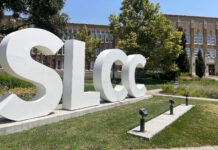
On June 29, the U.S. Supreme Court — in a vote along ideological lines — ruled that colleges and universities across the country can no longer use race as a factor in college admissions, reversing almost 50 years of legal precedent.
The six-justice conservative supermajority handed down their opinion after the court heard arguments in two cases that challenged the legal basis of affirmative action policies. One case originated from Harvard College, and the other from the University of North Carolina — in both cases, nonprofit Students for Fair Admissions acted as the plaintiff.
The organization contended that each college’s race-conscious selection practices discriminated against applicants that don’t identify as White, Black or Latino — namely, in each case, Asian applicants. In both cases, Students for Fair Admissions expressed the organization’s belief in race-neutral alternatives to reaching diversity goals.
The Supreme Court’s decision upheld those arguments and means that colleges now have no choice but to abandon affirmative action policies, such as admissions procedures that differentiate between otherwise equal applicants, often in favor of underrepresented groups.
History of affirmative action
For over 30 years, Harvard has used a “race-conscious” selection process in admissions, as many private colleges have, such as neighboring private liberal arts institution Wesleyan University. Their legal basis for doing so lay in a previous ruling that resulted from Regents of the University of California v. Bakke, a case the Supreme Court heard in 1978.
Regents v. Bakke established that schools may factor race into their admissions process. That precedent was upheld in 2003 with the case Grutter v. Bollinger, where the court ruled that using race as a determining factor in the admissions process did not violate the Equal Protection Clause of the 14th Amendment of the Constitution.
However, with the new ruling, affirmative action procedures are now found unconstitutional, and colleges will have to figure out different ways to foster diverse student bodies.
A state equivalent of the recent federal ruling, a 2006 ban on affirmative action policies in Michigan state law, preceded major decreases in the percentages of Black and Native students that make up the student body at the University of Michigan.
A contrasting response thus far has been some colleges ending the use of “legacy preference” in admissions — a practice where favoritism is shown to applicants with a family history of enrollment at the school they’re applying to.
One college to officially end legacy preference in their selection process is Wesleyan University, whose president, Michael Roth, made the announcement less than a month after the Supreme Court’s ruling on affirmative action.
Effect on Utah students
According to Kate Gildea, director of admissions for Salt Lake Community College, the Supreme Court decision on affirmative action will have no impact on students applying to SLCC.
“We’re an open-access, open-enrollment institution, so we have never made any admissions decisions on anything regarding affirmative action,” Gildea said.
The University of Utah will not face repercussions from the court ruling, either. According to U. Admissions Director John Marfield, race already did not play a role, even as a “tiebreaker,” in the school’s admissions practices. Legacy preference is also not considered in the selection process at the U., Marfield said.
As for colleges that previously relied on race-conscious admissions to bolster diversity on their campuses, Marfield said alternative avenues to the same end will have to be explored.
“The colleges and universities that have relied on affirmative action to increase the level of historically underrepresented students in their classrooms will always be devoted to admitting students from all backgrounds,” Marfield said. “[But] outreach and access initiatives will be even more important as those schools look to diversify their classrooms, especially in the short term.”
With SLCC being the most diverse collegiate student body in Utah, Gildea said she has seen firsthand the benefits of promoting diversity on campus.
“I didn’t go to school in a diverse setting,” she said, “and so having the opportunity to work here and attend some of the classes, see some of the curriculum that we teach here … I would have loved to have been a student here.”
“How much I would’ve loved hearing so many different perspectives and being able to view everything as far as history, economics, etcetera — all from a different lens than what I grew up with … I would’ve loved that,” Gildea continued.
In addition to SLCC and the U., Utah State, Utah Valley and Weber State universities, as well as Westminster College, do not consider race during the application process. USU and Westminster released public statements reiterating this point following the Supreme Court’s recent ruling on affirmative action.
Still, Gildea said it’s important for any prospective student to research the application process and requirements of the institution they wish to attend and to do so thoroughly.
“All institutions have their own policies, so it’s important to do your research,” she said, adding that this also applies when students are looking to transfer from a two-year to a four-year school.
However, despite the fact that SLCC does not use affirmative action policies, Gildea continues to believe in bolstering access to education for all who desire it.
“I am never in support of any ruling or anything that hurts students or puts any kind of roadblock in the way of their pursuing higher education,” she said.






